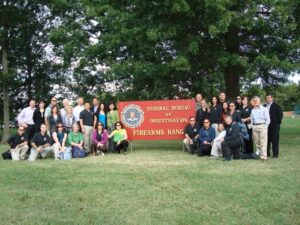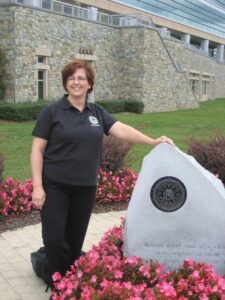Our own Karin Tabke gave me wonderful advice several years ago regarding research.
Less is more.
I’m not a cop. I’m not a doctor. I’m not a teacher or a nurse or a bartender or a scientist or a killer. I rely on reading, interviews, and “field trips” for my information.
Reading comes first: I have more than four dozen forensic and crime research books. I’ve been reading true crime novels since reading IN COLD BLOOD by Truman Capote when I was 13. On my desk now is BOOK OF POISONS, a Writer’s Digest tome that I’ve used many times, and need for my current WIP.
But reading doesn’t always work.
For example, in SEE NO EVIL, I had a throwaway line about Valium. I don’t use Valium, and I looked at an old Vicodin prescription from my C-Section. I used those numbers, not realizing that the larger number related to the Tylenol content and the smaller number to the Vicodin. And, Vicodin is not Valium. A nurse emailed me highlighting my error. Had I not mentioned a dosage, I would have been fine.
Less is more.
Interviews are also an important part of research. While I spend more time using my books and vetted websites for the majority of my information, interviews provide me with more than just facts.
I use two types of interviews – emails and personal. Emails to friends who are experts in their field, like fellow writers CJ Lyons and Dr. DP Lyle, are extremely valuable. Writers understand writers. I can give them the set-up and what I need to have happen, and they help me with the details. Or, better, if I’m stuck—if I have this great crime by haven’t been able to put it quite together—I can explain what’s going on and we can brainstorm. I also will call professionals I don’t know—such as when I was researching Above Reproach, my GUNS AND ROSES short story, I called the public information officer for Sacramento P.D. to find out how the sex crimes unit was structured. (I learned then that there were only six detectives assigned to sex crimes in the city of Sacramento.) Brainstorming with a writer who is also an expert in their field is one of my favorite research venues. And I never discount writers on my loops like the Kiss of Death chapter or the gals here at Murder She Writes–I can always find answers to the most esoteric questions.
Personal interviews are also valuable because conversations are proactive. I can ask follow-up questions, we build a rapport, and I get the added benefit of body language.
While I love reading and talking, field trips are the most fun. I’ve been to the morgue, I’ve participated as a role player in SWAT training, and I’ve toured Folsom Prison, among many others. On Monday, I was at the FBI Academy at Quantico.
 I’ve toured Quantico as part of my FBI Citizen’s Academy group, but this tour had several bonuses. I was able to go places that larger groups couldn’t—such as the BSU unit in the basement. I had the undivided attention of the Media Representative, Kurt Crawford, who answered all my questions. I met others—like the SSA in charge of physical training and defensive tactics who became an invaluable resource for STALKED, Lucy Kincaid #5, which takes place largely at the FBI Academy.
I’ve toured Quantico as part of my FBI Citizen’s Academy group, but this tour had several bonuses. I was able to go places that larger groups couldn’t—such as the BSU unit in the basement. I had the undivided attention of the Media Representative, Kurt Crawford, who answered all my questions. I met others—like the SSA in charge of physical training and defensive tactics who became an invaluable resource for STALKED, Lucy Kincaid #5, which takes place largely at the FBI Academy.
I probably didn’t have to go back and visit, but since I’m a very visual person, having the place fresh in my mind, and going places I haven’t gone before, helps me immensely. I can better picture my characters and the setting. In fact, while I’d been averaging only 1,000 words a day before my trip, I’ve written 2,000 a day this week. If nothing else, the on-site research got my muse working harder!
But with all this research—which is a lot of fun in what can sometimes be a very solitary job—I never forget what Karin taught me.
Less is more.
Most of the information I learned will never find its way into a book. In fact, probably less than 1% actually gets on the page. But feelings, atmosphere, and necessary details will find their way in print, and I hope the story is better for it.
 When I participate in SWAT training or tours, I feel like I’m almost in another career. I learn so much in such a short period of time, I can almost picture myself as a cop or FBI agent or forensic pathologist. A little known bit of trivia about me? When I was in seventh grade, I said I wanted to be a forensic pathologist when I grew up. That I’ve spent a couple days at the morgue was a genuine thrill. It was a job I could have done, and because I had an interest so long ago, I absorbed a lot more than I expected. Even more important for me is staging–while I like movies to help visualize action scenes and television shows for blocking, being part of the action during role playing or observing prisoners or cops helps even more. I can’t really quantify the value–I sort of absorb what I’m seeing and use what I’ve learned to craft my own stories.
When I participate in SWAT training or tours, I feel like I’m almost in another career. I learn so much in such a short period of time, I can almost picture myself as a cop or FBI agent or forensic pathologist. A little known bit of trivia about me? When I was in seventh grade, I said I wanted to be a forensic pathologist when I grew up. That I’ve spent a couple days at the morgue was a genuine thrill. It was a job I could have done, and because I had an interest so long ago, I absorbed a lot more than I expected. Even more important for me is staging–while I like movies to help visualize action scenes and television shows for blocking, being part of the action during role playing or observing prisoners or cops helps even more. I can’t really quantify the value–I sort of absorb what I’m seeing and use what I’ve learned to craft my own stories.
Being a writer is hugely rewarding, but I also get to live vicariously through my characters. I can be a new agent going through the FBI Academy. I can be a seasoned detective investigating a murder. And I can be a forensic pathologist finding the cause of death. At least for a few months.
If you could shadow someone in any career for a week, what would it be?
